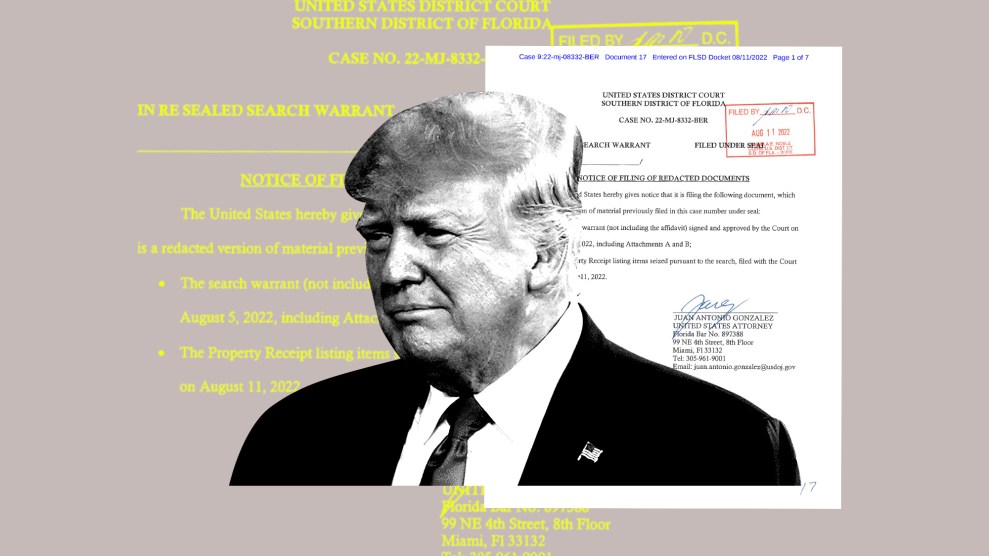
Mother Jones illustration; Brian Cahn/ZUMA
As Friday wears on, the news for former President Donald Trump is getting worse. The search warrant and related documents detailing Monday’s raid on Mar-a-Lago showed that the FBI “removed 11 sets of classified documents, including some marked as top secret and meant to be only available in special government facilities,” the Wall Street Journal reported.
Among the approximately 20 boxes of documents confiscated by the FBI were papers described as “‘Various classified/TS/SCI documents,’ an abbreviation that refers to top-secret/sensitive compartmented information,” the Journal wrote. “It also says agents collected four sets of top secret documents, three sets of secret documents, and three sets of confidential documents.” The contents also included information on the “President of France.” The warrant revealed that Trump is under investigation for violating multiple federal laws, including the Espionage Act. As the New York Times reported Friday afternoon:
The search warrant for Trump’s residence cited three criminal laws, all from Title 18 of the United States Code. Section 793, better known as the Espionage Act, which covers the unlawful retention of defense-related information that could harm the United States or aid a foreign adversary; Section 1519, which covers destroying or concealing documents to obstruct government investigations or administrative proceedings; and Section 2071, which covers the unlawful removal of government records. Notably, none of those laws turn on whether information was deemed to be unclassified.
Trump issued a statement that appeared to confirm reports that some of the highly classified information he was illegally storing was about nuclear weapons. “President Barack Hussein Obama kept 33 million pages of documents, much of them classified,” he said. “How many of them pertained to nuclear? Word is, lots!” The National Archives quickly debunked Trump’s attempt at whataboutism—it is in control of Obama’s records, as required by law.
While Trump is fundraising off of allegations of political persecution by the FBI, a judge in New York on Friday refused to dismiss a criminal case against his business, the Trump Organization, which includes charges of tax fraud. Also this week, Trump pleaded the Fifth in a deposition in a New York state case over whether he inflated the value of his holdings.
In this busy week, as slow-moving cases and investigations have taken large, public steps forward, Trump has sought to use the bad news to his advantage, inflaming supporters and fundraising off of the fury. It put Trump’s allies in the position of arguing that stealing classified information isn’t so bad or claiming, dubiously, that Trump had actually declassified the documents.
Update, August 12: The judge overseeing the case released the warrant and related documents on Friday afternoon. Read it here:













